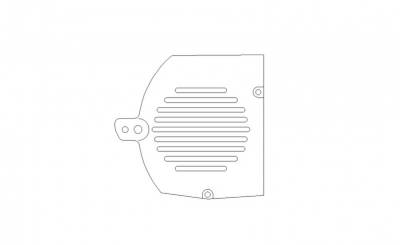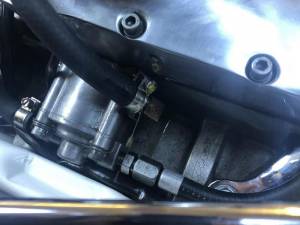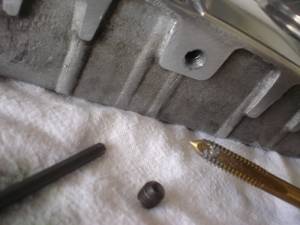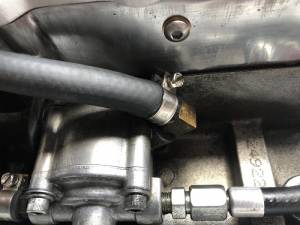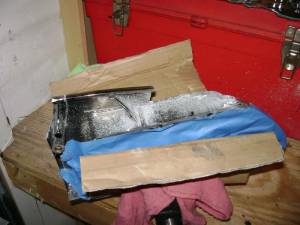Table of Contents
REF: Engine Mechanicals - Sub-03E
Chopping the Cam / Gearcase Cover
See also:
Some Suggestions and Tools
You can get it professionally chopped on a milling machine for around $100. (polishing not included)
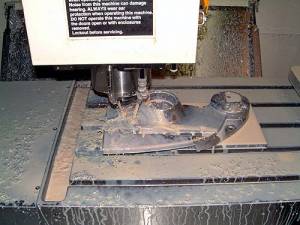 | 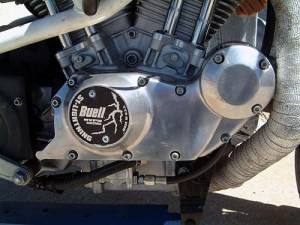 |
| Custom cam cover professionally cut down 1) | |
Benefits of chopping the cover:
There no benefits whatsoever of chopping the cover other than to change the cosmetic appearance of it. 2)
All you're doing by chopping / machining it is changing the look.
Design:
You can sketch out a design and lay it up on the bike as it would be installed.
That way, you get to see it before cutting it which may cut down on costs of another one after the fact.
Oil Passages:
Check the oil passages around the bushings before you start cutting on the cover.
Some have a factory drilled oil passage (1/8“) through the cover going to the pinion bushing area. The hole on the lower edge of the cam cover was then welded to seal this hole. 4)
After cutting thru this hole, it can be plugged again by running a 1/4”x20 tap in and threading a screw into it (with a copper washer). 5)
It is not a overflow hole or anything that should be open.
Some have used silicone or epoxy to plug the hole. However, some have also had silicone break loose from heat and plug up vital oil passages.
So a threaded plug / bolt is best to use.
Dowel Pins:
It's also important to keep the dowel pin holes intact. With dowels front and rear,
It ensures the accurate alignment of the bearings / bushings in use. 8)
It also ensures correct alignment of the cam cover if or when you have to line ream replacement cam bushings. 9)
Cutting the cover while installed:
While it is possible to cut the cover down while it is installed on the engine, it's safer to remove it.
When removed, the cutting can be done more easily and the finish more smoothly.
When installed, the issue is more avoiding the oil lines and oil pump,
Especially the return line that already gets worn thin by rubbing the back side of the cover.
It would also be very difficult to see what you are doing there on the top back side (near the pulley). 10)
Get everything out of the way.
Tape off the area to be cut.
Use a muffler cutter air tool (or other) to remove most of the material.
Then work it with a file to the desired shape.
Always take off less than more. You can keep cutting, but if you go to far you can't put it back.
It's time consuming and harder to do than having the cover off. 11)
To remove the cam cover:
The lower rocker box has to come off the head (properly) enough to relieve tension on the pushrods / valves / lifters / cams. 12)
Without the spring tension, the cams will want to follow the cover, so keep on eye on them and go slowly.
You might have to stick something between the case and cover, and push them back in as the cover comes off 13) (like a screwdriver or putty knife).
Guys do it either way (cover on / cover off), so it's whatever you decide to do 14) (with an educated decision).
But, with the cam only being supported by the bushing on the one end and the valve spring pressure pushing down,
There is chance of damage to any cam bushing (cover or case) while removing or installing the cover.
With valve spring tension on the cam lobes, once the cover is removed, the tension pushes down (vertically) on the cams.
With a very tight cam to bushing tolerance, there is little room for vertical movement.
The tension can shove the end of the steel camshaft into the soft bushing bore and damage it.
(as tension pushes one end down, the other end moves up and can gouge the bushing)
Just be careful sliding the cover off. Make sure you come straight out slowly, and look inside the case with a flashlight.
When you get it cracked open, make sure you're not pulling the cams out. 15)
For Cutting the Cover
- Saws-all.
- Angle grinder with a metal cutting blade.
- Hacksaw.
- Jigsaw.
- A Dremil rotary tool can be used but the metal cutting blade is too small to cut at 90° angles.
The O.D. of the body is wider than the cutting bit.
(You'll end up making angled cuts instead of straight ones (good if that is intended).
- A mechanical or CNC mill is very helpful for precise and non-jagged cuts.
- Caution:
- Be in control of any power cutting tools at all times. Kick-back can do serious bodily harm.
If the cover jumps out the clamped area, let it fall. Make sure the cutting blade has stopped and the tool properly secured before worrying about the cover. - Learn the safety rules for the tool before using it.
- That is not meant as a cliché. An angle grinder can get loose and tear the skin to the bone before you know it.
- If you're not accustomed to using the tool, practice first on some scrap material before cutting your piece.
| Cover cut out with a hacksaw. 16) | Cutting area marked out with tape. Cuts made with an angle grinder with the metal cut-off blade. 17) |
|
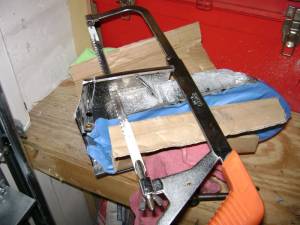 | 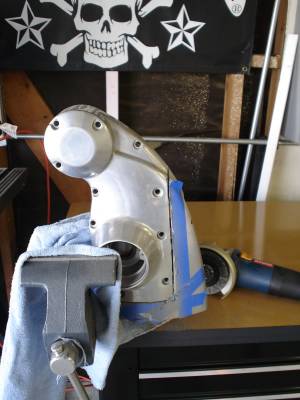 | 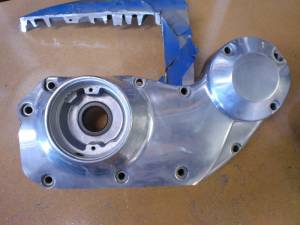 |
| Cover mounted to 2×4 table end with large “C” clamps and cut with a saws-all. 18) | ||
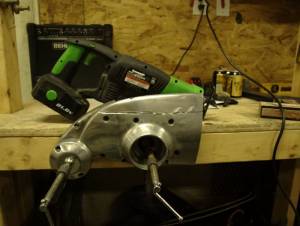 | 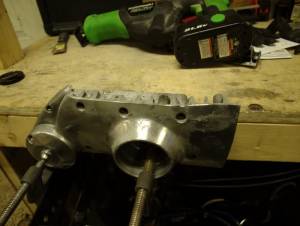 | 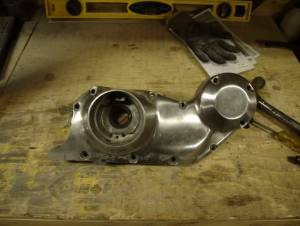 |
| Cover bolted to a sheet of steel as a jig to hold the cover in a vise for machining the excess off with a milling machine 19) | ||
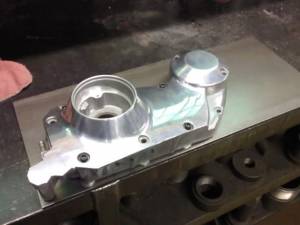 | 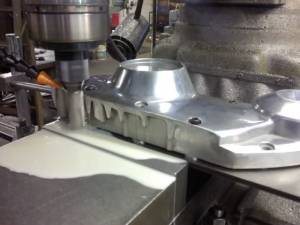 | 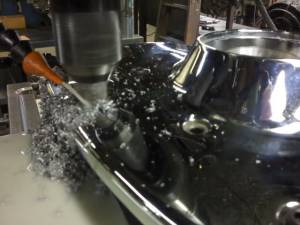 |
To Protect the Aluminum from Scratches While Cutting
- Painters tape, placed on the cut line can help keep down rips and jagged edges at the cut line.
It will also help keep the tool from marring the finish that you want to keep.
You can also use it to tape off areas to keep out debris. - Soft jaws in a bench vise (soft plastic or rubber) may help will marring of the finish.
However, soft jaws may not allow you to get the piece tight enough in the vise. You may have to play it by ear. - A towel to wrap the cover in before chucking into a bench vise or as a soft base for your work piece.
- A small piece of cardboard can also serve as a soft base for your work piece.
- Plywood can be used between the cover and the vise or clamp jaws for surface protection.
Place the tape over all areas where the cutting tool might butt into the cover.
The towel protects the cover from being gouged by the vise jaws and can serve as a soft base for hand work.
For Holding the Cover While Cutting
- The bench vice above will work well for cutting the cover with a handsaw.
- The wooden table below while clamping the cover to it with large “C” clamps will hold the cover tighter in place.
- However when using an angle grinder or most power saws, if the blade catches the wrong way while cutting, it will jerk the piece out of the work station (or the tool into you).
| Cover mounted to 2×4 table end with large “C” clamps and cut with a saws-all. 22) | ||
 |  |  |
For Shaping and Smoothing
- Angle grinder.
- Bench grinder.
- Belt sander.
- Palm sander
- Hand files.
Try a belt sander first and then finish with a palm sander. 23)
You can use a heavy sander up to 'almost' the line to stop. Then light finish to the line.
This is where a large part of the project is spent.
| Basic shaping done with the sander and files. (this can take several hours) 24) | ||
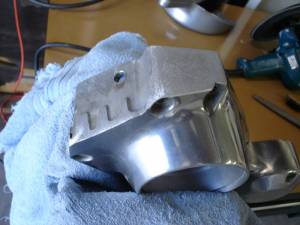 | 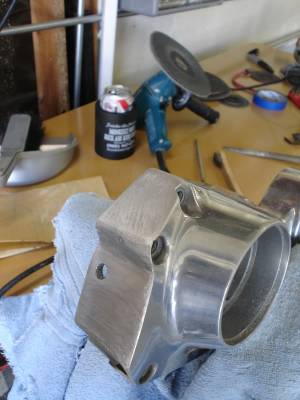 |  |
| This cover was shaped with a combination of grinding stones, flapper wheels, an angle grinder with a sandpaper disc and palm sanders. 25) | ||
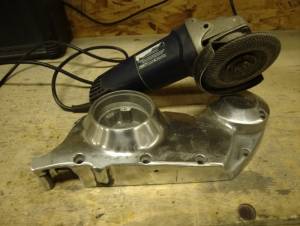 | 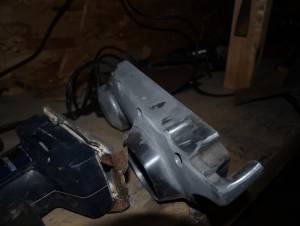 | 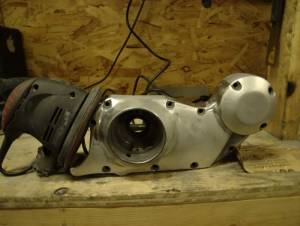 |
For Finishing
- Wet dry 220/400.
- Steel wool.
- WD-40.
- Aluminum polish.
| The mounting holes were notched near the cut areas to make them all symmetric. The surface was finished with steel wool/WD-40 and aluminum polish 26) |
||
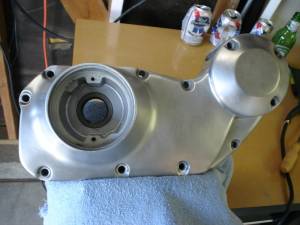 | 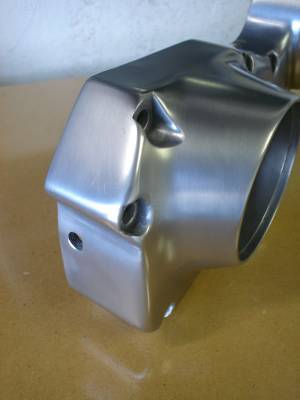 | 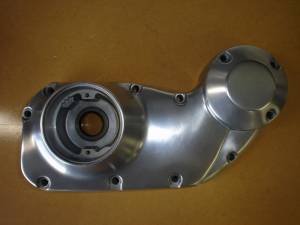 |

